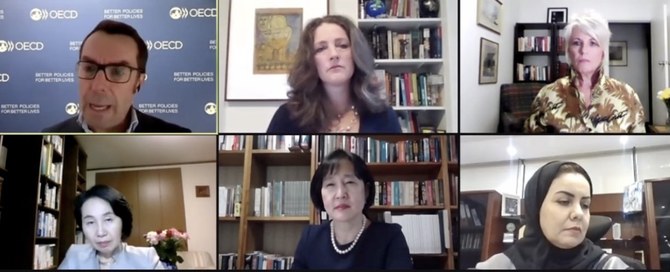RIYADH: The second day of the virtual Women 20 (W20) meeting — hosted by Saudi Arabia as part of its G20 presidency — stressed the importance of ensuring inclusivity across the G20’s different working groups.
“The women’s empowerment team at the G20 Secretariat was established by the Saudi sherpa and… my team has engaged with working groups and discussed their topics, such as finance-track development, employment, health, education, agriculture, anti-corruption, energy, the digital economy, tourism, and trade and investments,” said Hala Altuwaijri, chair of the Women's Empowerment Team at the G20 Secretariat and secretary-general of the Family Affairs Council.
She added: “What we learned from previous presidencies is that we look at female empowerment as mainstream, as cross-cutting, and that it should not be the focus of one group only. In other words, every working group should have the empowerment of women as a priority... this is what the Saudi presidency has committed to.”
Addressing gender in the workplace, Libby Lyons, director of the Workplace Gender Equality Agency in Australia, said that Australia will close the equality gap at all management levels within the next 20 years.
“Forty-three percent (of) all promotions went to women last year in the private sector in Australia. The problem persists, however, for women accessing leadership positions such as CEOs and board members,” she said in a session titled “G20 Policies: Catalyzing Women's Economic Empowerment.”
Lyons’ agency has been collecting data annually for more than seven years from every organization in the private sector with more than 100 employees, giving it a clear picture of what is happening in terms of gender equality. “We must collect standardized data to track what we are doing and assess our actions,” she noted.
She said that in Australia, private enterprise is driving this change, facilitated by the government, which is a unique model. “I think that it is a lesson we can all learn,” Lyons said.
Discussing the most notable G20 commitments over the last five years, Wendy Teleki, head of We-Fi Secretariat, said that We-Fi was founded in 2017 at the G20 Hamburg Summit focused on supporting entrepreneurs around the world.
Since then, it has allocated $300 million in funds through its partners to programs that are ultimately expected to benefit more than 130,000 women, she added.
This year, We-Fi has allocated an additional $50 million and Teleki said that another $50 million “will be allocated to the issues of technology, early-stage financing, and COVID-19 relief response to empower women entrepreneurs and help them in their reliance on technology.”
Addressing the private-sector alliance, empowerment and progression of women’s economic representation, which was established last year in Japan as a means to advocate the advancement of women in the private sector, Tomoko Hayashi, director-general of the Gender Equality Bureau in the Cabinet Office said: “The Empower project…aims to increase the number of women with access to leadership positions. Also it devises actionable plans to increase the digital literacy of women in developing countries.”
She added: “COVID-19 has greatly impacted women, including (by) increasing rates of unemployment and domestic violence. At the same time, it created a great opportunity for women to change the rules of the game.”



























